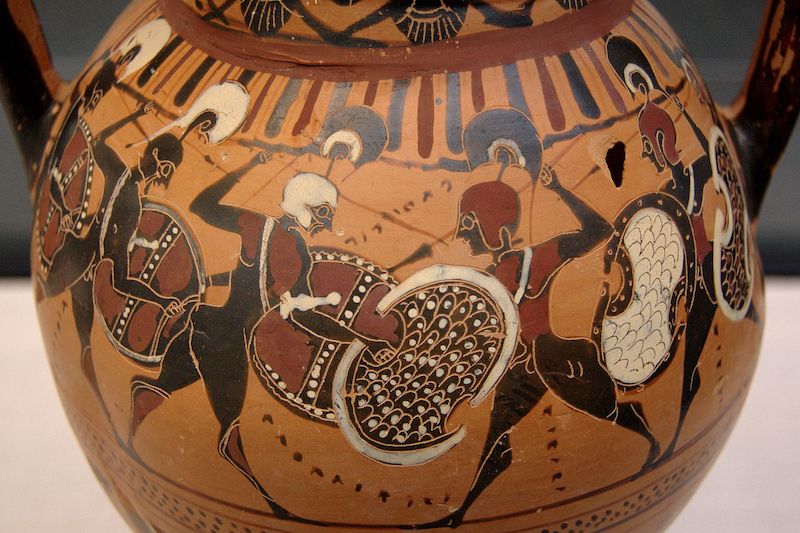Long ago, in Ancient Greece, in the peaceful Thracian town of Stageira, a sage was born. This sage bore the name Aristotle. Growing up in the quiet streets of Stageira, Aristotle was born into a family of physicians. His father, Nikomakhos, was the personal physician and close friend of King Philip II of Macedonia. Nikomakhos’ knowledge of medicine laid the foundation for Aristotle’s future journey.
Aristotle had a curious spirit from his childhood. His interest in the secrets of nature led him to explore and learn. With the guidance of his father, the seeds of scientific thought were planted in young Aristotle’s mind. With the encouragement of Nikomakhos, Aristotle wanted to delve deeper into nature as he grew older.
In 367, the young Aristotle set off for Athens with a thirst for knowledge. He attended Plato’s famous Academy. Here, under Plato’s guidance, he was introduced to philosophy and began to push his mental limits. Aristotle shone as one of Plato’s most brilliant students, but in time he also began to chart his own philosophical path.
After Plato’s death, Aristotle decided to dive deeper into philosophy. He traveled to Assos and continued the Academy there. He criticized the Ideas and studied morality and politics. During this period, he began to put his thoughts down on paper and wrote many important works.
King Philip II of Macedonia became aware of Aristotle’s wisdom and invited him to his palace. Aristotle became the teacher of the king’s son Alexander. This eight-year education helped Alexander become the world emperor and made Aristotle famous.
But with Alexander’s death, Aristotle was forced to return to Athens. However, he was accused of being a Macedonian partisan and of heresy. During this difficult period, he had to go to Khalsis, his mother’s hometown. During this time, Aristotle’s philosophical thoughts deepened and matured further.
Aristotle’s most productive period was spent at the Lykeion in Athens, where he founded his own school. Here, he taught his classes with his students by traveling around. He thought deeply about metaphysics, logic, politics and many other subjects. He wrote his works, systematized the sciences and opened new paths in philosophy.
Aristotle’s “Metaphysics” became a guide to the depths of existence. It explored concepts such as the existence and attributes of God, the structure of the universe, time and motion. This work reflected his wisdom and intellectual depth. It also had a great impact on the Islamic world.
Aristotle’s philosophical legacy lived on even after his death. His wisdom and thoughts have been studied by philosophers and scientists for centuries. His contributions in the natural sciences, logic and metaphysics deepened and guided humanity’s knowledge and understanding.
In conclusion, Aristotle was one of the great thinkers not only of the ancient world but of all human history. His curiosity, inquisitive mind and profound thoughts left an important legacy in the field of science and philosophy. Aristotle’s story will remain an unforgettable tale that celebrates humanity’s hunger for knowledge and the desire to discover.
On the Trail of Natural Sciences. Aristotle’s life story, full of wisdom, was not only a journey into the depths of philosophy, but also a journey to unravel the secrets of nature. Aristotle’s inquisitive mind led him to explore the natural sciences as well.
Aristotle made great strides in the field of natural sciences for a while. It is known that he wrote nearly twenty works, large and small, in this field. These works, which aimed to understand and explain the functioning of nature, were translated into Arabic and aroused great interest in the Islamic world. However, there was a striking point. Islamic thinkers and writers often limited the number of Aristotle’s works in the field of natural sciences to eight. Sometimes they even grouped several works under one title. For example, the works on zoology were collected as one book and called “Kitāb al-Ḥaywān” (nineteen chapters).
The nine treatises on nature were collected under the title Parva Naturalia, which later became famous as De Sensu et Sensato. This work entered Islamic literature under the title “al-Ḥis wa’l-maḥsūs”. The classification of sciences in the Islamic world, which began with great thinkers such as al-Kindī and al-Fārābī, was similar to Aristotle’s works on natural sciences. However, the writers who came after Aristotle included psychology (De Anima) within the natural sciences. However, al-Kindī preferred to keep psychology in a separate position between physics and metaphysics.
Aristotle’s contributions to the natural sciences were shaped by his inquisitive mind and passion for scientific research. In trying to understand the depths of nature, he brought new perspectives to the world of science. This has been a legacy that not only the ancient world but also future generations have studied with interest.
On the Trail of Morality. Aristotle’s journey of wisdom was not limited to philosophy and natural sciences. His world of thought also offered guidance for understanding and resolving human moral values. Considered as the founder of the first systematic ethics of Antiquity, Aristotle was the pioneer of a path that questioned and guided human behavior.
In establishing his moral philosophy, Aristotle believed that all kinds of behavior should be in accordance with the “correct middle” (moderation), away from the two extremes. According to this principle, every human action should be balanced and measured. While ethics pointed the way to happiness and maturity, it emphasized that extremes should be avoided. Aristotle’s philosophy included his guidelines on how people should organize their lives and pursue their virtues.
Aristotle’s moral philosophy also aroused great interest in the Islamic world. However, Islamic philosophers and thinkers departed from Aristotle’s ethical philosophy by displaying their own original views. These divergences ranged from the relationship between God and the universe to the principles of existence, from the problems of time and motion to the state of the soul after death.
Thinkers in the Islamic world also showed interest in Aristotle’s moral philosophy. However, Aristotle’s ideas differed from the Islamic principles of ethics. According to Aristotle, happiness belonged only to an elite few and was influenced by factors such as social status and gender. Islam, on the other hand, taught that everyone could be happy through faith and good deeds.
Islamic thinkers defined morality by the basic principles found in the Qur’an and Sunnah. The Prophet’s morality was described as “the highest morality”, and the Qur’an and Sunnah were the main sources that transmitted high moral values to Islamic society. For this reason, Muslims preferred the moral principles of Islam over Aristotle’s moral theories.
While Aristotle’s ethical philosophy remained an important step in the history of mankind, it had significant differences when compared to Islam’s understanding of ethics. Islam’s universal and human-valuing approach reflected the aim of bringing morality to all of humanity, not just a certain group of people. For this reason, Aristotle’s moral philosophy remained more theoretical in the Islamic world and Islam’s moral principles were more dominantly applied.
In the Shadow of Politics Aristotle’s philosophical thoughts were not only limited to science and ethics, but also penetrated deep into politics. His “Politics” is considered to be a fundamental source for the study of political structures and forms of government. Interestingly, however, we have no evidence of its translation into Arabic or active use in the Islamic world.
In the pages of history, a work circulating under the title “Kitāb al-Siyāsa” appears. However, this work is a later fabrication and not originally by Aristotle. Interestingly, although this pseudonymous work did not carry Aristotle’s political ideas, it attracted attention in the Islamic cultural world over time because it included various subjects such as medicine, divination and astrology.
Classical Islamic sources also include several letters attributed to Aristotle. These letters generally contain Aristotle’s advice and are claimed to be addressed to Alexander on politics and ethics. However, these letters have been concluded to not actually belong to Aristotle, as they do not correspond to his way of thinking. The Islamic world of thought did not take these letters, which were laced with religious motifs, seriously because they did not reflect Aristotle’s actual thoughts.
Sources used:
Aristotle, Manṭıḳu Arisṭo (ed. ʿAbd al-Rahman Bedawī), Cairo 1948-52, I-III.
a.mlf., Organon (tr. H. Ragib Atademir), Istanbul 1963-67, I-V.
a.mlf., Kitāb al-Ḫaṭāba: Rhetorica (tr. I. Salāme), Cairo 1953.
a.mlf., Kitāb al-Shī’ir: Poetica (tr. İsmail Tunalı), Istanbul 1963.
a.mlf., al-Samāʿ al-ṭabīʿī: Physica (tr. Aḥmad Lutfī al-Sayyid), Cairo 1935, I-II.
a.mlf., Kitāb al-Nafs: De Anima (tr. A. Fuād al-Akhwānī), Cairo 1949.
a.mlf., Mā Baʿde al-ṭabīʿa: Metaphysica (in Tafsīru Mā Baʿde al-ṭabīʿa, ed. Maurice Bouyges), Beirut 1938-48, I-IV.
a.mlf., ʿIlm al-aḫlâḳ ilā Nīḳūmāḫūs (tr. Ahmed Lutfī es-Seyyid), Cairo 1343/1924, I-II.
Ptolemy al-Garīb, Fihrist al-Qutb al-Arisṭoṭālīs wa sīretüh, Suleymaniye Ktp., Ayasofya, nr. 4833, vr. 11b-14b.
al-Fārābī, es̱-S̱emerat al-merżiyya fī baʿżi al-risālāti al-Fārābiyya: Alfārābī’s Philosophische Abhandlungen (ed. F. Dieterici), Leiden 1890.
a.mlf., al-Jamʿ bayna reʾyayy al-ḥaqīmeyn (in al-S̱-S̱amarat al-merżiyya).
a.mlf., Fī Aġrāżi al-ḥaqqīm fī kulli maḳāla mine al-kitāb al-mawsūm bi al-Ḥurūf (in ibid.).
a.mlf., Iḥṣāʾ al-ʿulūm (ed. Á. González Palencia), Madrid 1953.
a.mlf., Felsefetü Arisṭoṭālīs (ed. Muhsin Mehdī), Beirut 1961, I-IV.
a.mlf., al-Madīnat al-fāżıla (ed. F. Dieterici), Leiden 1985.
Masʿūdī, al-Tanbīh.
Kindī, Resāʾil.
Ibn al-Nadīm, al-Fihrist, pp. 239, 345-352.
Ibn Sīnā, al-Ishārāt.
a.mlf., al-Najāt (ed. Muhyiddin Sabri), Cairo 1331.
Saʿīd al-Andalusī, Ṭabaḳāt al-ʿumam, Cairo, ts., pp. 26, 29.
Ibn Fāṭiq, Muḫtār al-ḥikam wa meḥāsin al-kelim (ed. ʿAbd al-Rahman Bedawī), Beirut 1980, pp. 178-184.
Ibn Rushd, Resāʾil, Hyderābād 1947.
a.mlf., Talḫīṣu Kitāb al-Nafs (ed. A. Fuād al-Akhwānī), Cairo 1950.
Ibn al-Kiftī, Iḫbār al-ʿulamāʾ, pp. 21-40.
Ibn Abū Usaybia, ʿUyūn al-anbāʾ, Cairo 1882, I, 54-69.
Abdurrahman Bedawī, Arisṭo ʿinde al-ʿArab, Cairo 1947.
a.mlf., al-Aflaṭūniyya al-Muḥdasa ʿinde al-ʿArab, Cairo 1955.
a.mlf., Aflaṭūn ʿinde al-ʿArab, Cairo 1955.
R. Walzer, Greek into Arabic: Essays on Islamic Philosophy, Oxford 1962.
D. Laertius, Lives of Eminent Philosophers (ed. R. D. Hicks), London 1965-66, I-II.
F. E. Peters, Aristotle and Arabs, London 1968.
De Lacy O’Leary, Islamic Thought and its Place in History (tr. Hüseyin Yurdaydın – Yaşar Kutluay), Ankara 1971.
A.-H. Chroust, Aristotle: New Light on His Life and on Some of His Lost Works, London 1973, I-II.
Mahmut Kaya, Aristotle and Philosophy in the Light of Islamic Sources, Istanbul 1983.
R. Walzer, “Arisṭūṭālīs or Arisṭū”, EI2 (Eng.), I, 630-633.



